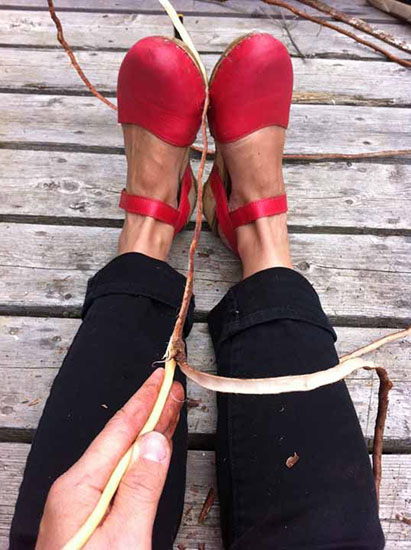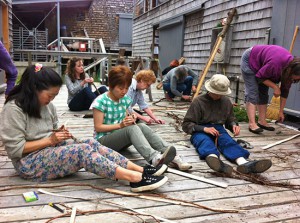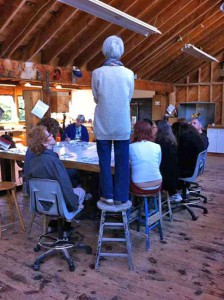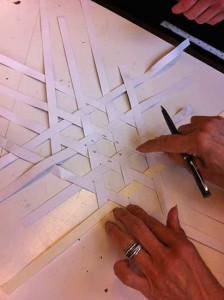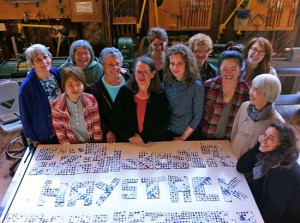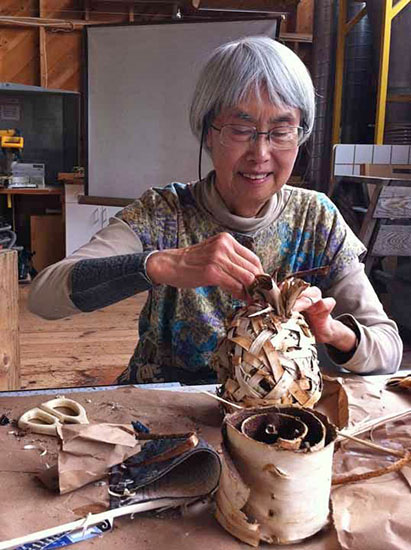Hisako Sekijima at Haystack School of Crafts, Deer Isle, Maine
In my morning check of e-mail in early September, I was happily reconnected with Haystack Mountain School of Crafts in Deer Isle, Maine by a message from Meghan Price, asking “Flexible Minds!” to share her memorable photographs of Haystack 2013. Meghan is a textile artist from Toronto who assisted me in the basketry workshop I presented there this summer. The workshop, Strong Materials and Flexible Minds, ran from August 11th to 23rd. It was my fourth workshop at Haystack and my second with Meghan’s assistance.
In this summer’s workshop there were fourteen people working hard in a spacious woodshop overlooking a Maine spruce forest and bay; twelve participants from Canada, Japan, Israel, Denmark and the US. The class members were diverse in nationality, age, professional career and skill level, but homogeneous in other ways – all female, flexible minded, friendly and diligent. I enjoyed working with them greatly and I appreciated that Haystack gave us such an enjoyable temporary community of art. It is wonderful that Haystack has retained for many years its beautiful location, thoughtful management and sustainable considerations for the environment, along with a highly stimulating artistic atmosphere. I admire even more the numberless individuals and groups whose innovative effort and contributions have enabled Haystack to remain unchanged for its long history.
I have designed my workshops as very experimental as well as hands-on. I assign a small number of basic problems of basketmaking that participants are expected to explore by themselves. I expect participants to encounter additional problems and challenges unique to each of them in the process of seeking a resolution to the problem assigned. I entitled the workshop at Haystack this summer Strong Materials and Flexible Minds, in order to convey clearly my intent to encourage participants to re-conceive basketmaking in terms of the relationship of a maker to the materials. Participants would re-evaluate already acquired techniques and common ideas while taking a fresh look at the materials domain as well as nonmaterial factors such as negative space. From alternative viewpoints, we reviewed familiar tools/devices. In short, the workshop was to help one learn again or “un-learn” what one thinks one knows.
The group photograph shows the happy class after finishing an improvised installation with various pieces plaited in paper tapes cut from old Haystack posters. The layout on the table reads “H-A-Y-S-T-A-C-K.” Why are they happy? Because they have gained confidence: “I can make any form in plaiting by myself!” The exercise involved an exploration of plaiting. I taught them only how to make a square with three strands and left it to them to find from there how to make various forms. Some did so very easily. Some struggled. But I waited until each had mastered it herself. The next morning, I discussed the outcome, bringing attention to various resolutions that could achieve the same form. and explained that their development would lead to further differences. Everyone was amazed that the same form had emerged, but had not always been accomplished in the same way. That is, everyone realized that each could create in her own way if not taught to apply only a single method by a teacher. Everyone came to feel her own way – not only worth her patience but also more meaningful to her. The photograph shows the joy of achieving a challenge, on students’ part as well as a teacher’s.
Hisako Sekijima Yokohama, Japan

